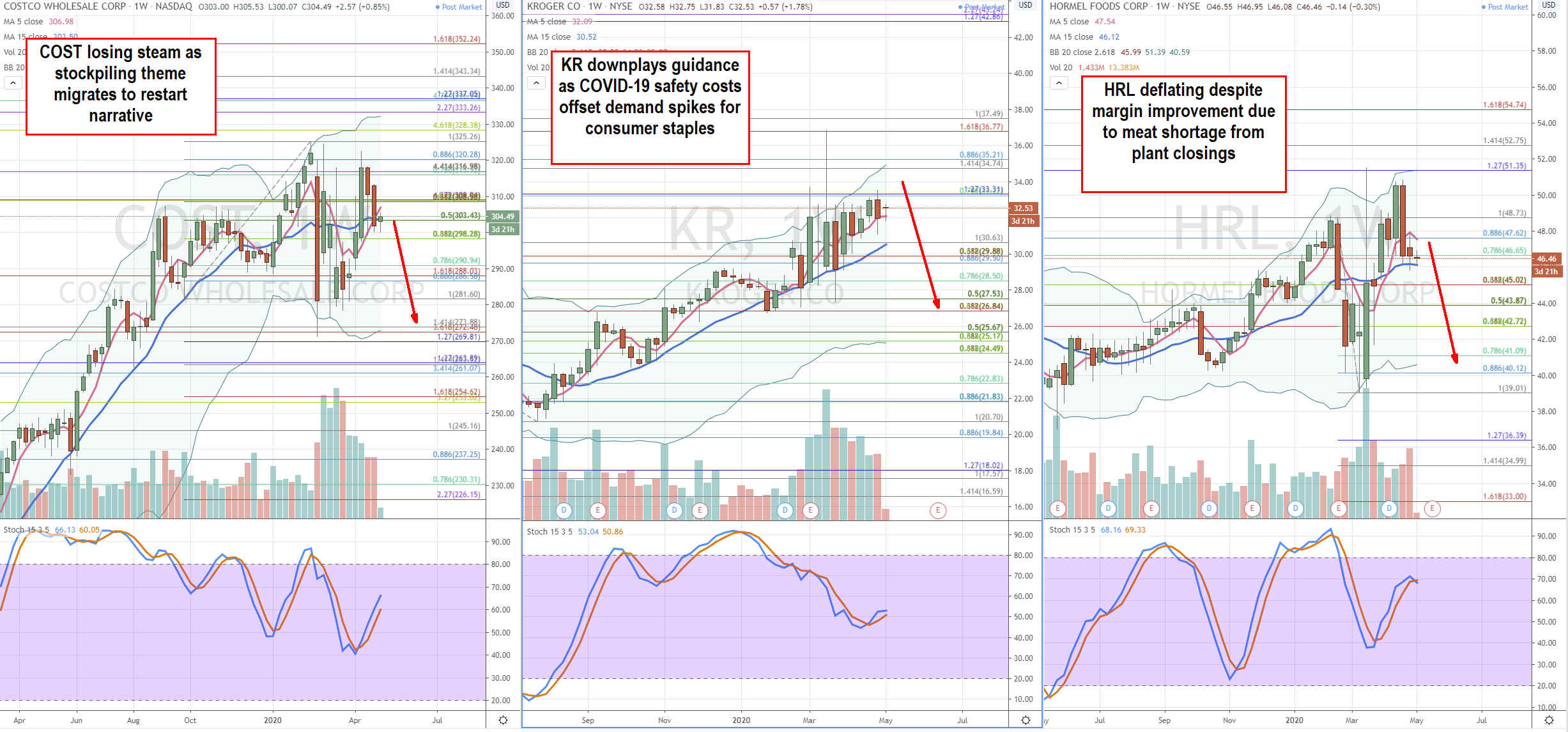The stockpiling narrative took shape as the spread of coronavirus triggered stay-at-home mandates causing consumers to load up on essential supplies for the long haul. As the COVID-19 black swan triggered sharp sell-offs in stocks commencing in February 2020 as the
S&P 500 (NYSEARCA: SPY) took a (-34%) plunge off its all-time highs, stockpiling stocks transformed into a form of hedge product. The logic was justified as companies reported heavy demand causing supply restraints.
Fast forward to 2H 2020, the stockpiling narrative is shifting to a restart narrative as isolation mandates get lifted and consumers revert back to “normal” spending habits. The stockpiling stocks that thrived during the lockdowns should start to see a normalization of valuations as demand falls. Here are three of the most susceptible stocks that should shares deflate back to “normal” levels.
Costco
This warehouse giant regularly saw lines stretching around the block from consumers anxiously on the hunt for toilet paper and essentials. Costco (NASDAQ: COST) reported sharp demand spikes in essential products which were often offset by supply shortages and purchase limitations. Low margin products including toiletries, diapers, non-perishable and perishable foods, and medicine were offset by demand declines in consumer discretionary products like clothes. It stands to reason that demand can’t possibly be sustained once a resumption of “normal” life resumes. This has been expressed by management that much of the sales is simply an acceleration of revenues for specific items for several quarters that should even out in time. This is why these stocks are trading like a hedge product rather than an investment based on fundamentals. As companies report earnings, it’s become apparent that the higher demand and topline growth is tempered with higher expenses and costs associated with manufacturing and shipping costs. The Q2 2020 earnings beast estimates by $0.04-per share. Comparable e-commerce sales rose 28% and up 11.17% on an adjusted basis. Costco rode this theme price $4 billion of notes that closed on April 20th. Shares have yet to return to the pre-COVID-19 highs of $325.26 on Feb. 21, 2020.
The question is whether this is the “best it gets”?
Kroger
The supermarket giant Kroger (NYSE: KR) saw its shares recover off its lows of $26.72 on Jan. 31, 2020 to reach a high of $36.84 on Mar. 18, 2020 before plunging towards the $27.50. This is indicative of the anxious nature of the stockpiling narrative. Supply chain disorder hurts these supermarkets as they implement price controls, purchase limitations and experience rising labor costs for workers to show up.
Kroger reported Q4 2019 earnings of $0.57-per shares beating consensus estimates by $0.01-per share. The company reaffirmed FY 2021 EPS of $2.30 to $2.40 vs. $2.35-per share. They confirmed FY 20 guidance on April 1stand expects volatility with rising costs related to COVID-19 measures to protect workers and customers. On May 1, Kroger implemented meat purchase limits due to the meat shortage as supplies dwindle with farm and ranch closings. The spread of COVID-19 has shuttered many of the nation's largest processing plants as 25% of pork and 10% of beef capacity have been cut out amid demand fueling a 40% increase in meat sales. The self-imposed quantity purchase limits have frustrated consumers who will go to other big box stores like Walmart (NYSE: WMT) that have no plans to implement customer purchase limits on meat.

Hormel Foods
Meat and food products maker Hormel Foods (NYSE: HRL) has seen sharp demand for its food products. Perishable food products include fresh meats to microwaveable meals and luncheon meats. The company announced it will reopen the Rochelle Foods plant in Chicago, IL amid the pending meat shortage crisis. The plant was closed for 14-days due to the spread of COVID-19. The company is also paying up bonuses for plant workers. The closing of competitor Tyson’s (NYSE: TSN) many meat processing plants has triggered an impending meat shortage causing prices to surge. Incidentally, slaughterhouses are seeing margins soar up to 340% since April. Despite potential upside for margins shares are deflating with the rest of the industry competitors as a group. Investors may want to consider locking in profits before the reversion back to normalcy kicks in.
Before you make your next trade, you'll want to hear this.
MarketBeat keeps track of Wall Street's top-rated and best performing research analysts and the stocks they recommend to their clients on a daily basis.
Our team has identified the five stocks that top analysts are quietly whispering to their clients to buy now before the broader market catches on... and none of the big name stocks were on the list.
They believe these five stocks are the five best companies for investors to buy now...
See The Five Stocks Here
Enter your email address and we'll send you MarketBeat's list of ten stocks that are set to soar in Spring 2025, despite the threat of tariffs and other economic uncertainty. These ten stocks are incredibly resilient and are likely to thrive in any economic environment.
Get This Free Report
Like this article? Share it with a colleague.
Link copied to clipboard.